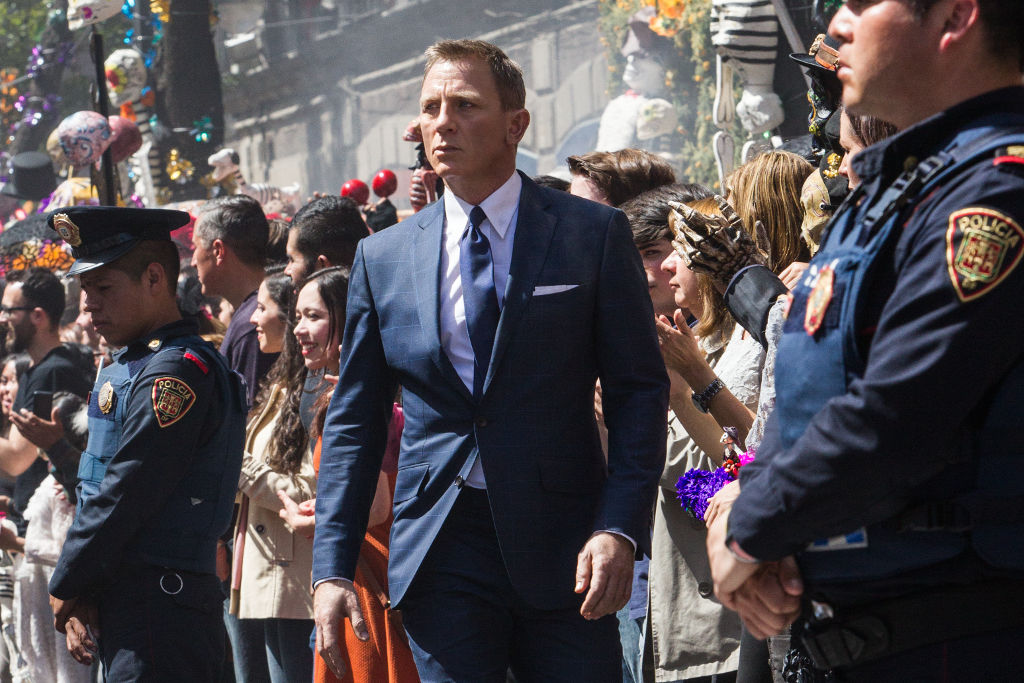Review: ‘Spectre’ May Look Spectacular, But James Bond Is Still Going Through The Motions
It's all so BOND.

In the James Bond universe, the criminal organisation SPECTRE was originally an acronym: Special Executive for Counter-intelligence, Terrorism, Revenge and Extortion. First introduced in the legally contentious novel Thunderball (1961), SPECTRE represented a shift in Bondian geopolitics: away from its Cold War focus on state-based spy agencies, and towards a new era of international, entrepreneurial and ultimately corporatised agents.
But even though Eon Productions wrestled back the screen rights to SPECTRE and its cat-stroking mastermind Ernst Stavro Blofeld in 2013, the film Spectre chooses to be much more literal. It’s about ghosts from Bond’s past. This is a handy metaphor for the Bond franchise’s own obsession with its heritage, after 53 years and 24 films.
But Spectre is also the most ectoplasmically transparent move yet by the franchise to do for Bond what Christopher Nolan did for Batman. Like Christian Bale’s Bruce Wayne, Daniel Craig’s Bond is tormented and motivated by memories of the dead, and finds himself at odds with rapid ideological shifts within the institutions for which he supposedly works.
Lavishly budgeted, theatrically composed, and stylishly shot by Interstellar and Her cinematographer Hoyt van Hoytema, Spectre looks a million bucks and hits all the right Bondian notes. But it feels aimless and entropic: the last gasp of a cycle dating back to Casino Royale (2006), which was already satisfyingly resolved in Skyfall (2012). Daniel Craig’s zero-fucks approach to the PR circuit certainly suggests his weariness in the role, which is borne out in his increasingly dour screen presence.
Perhaps director Sam Mendes and his team of screenwriters (headed by Skyfall writer John Logan) were too busy retconning Dark Bond to pay attention to the plot. It is nonsensical. The villain has no evil master plan other than ‘fucking up Bond’s life’, there are logic holes you can drive an Aston Martin through — and the drawn-out final act ends with a whimper, not a flourish.
–
Escaping The Spectre of Bondtropy
My dad, like many people’s dads I suppose, instilled in me an early love for the Bond franchise. He’s been eagerly looking forward to Spectre, and I had no problem telling him he would enjoy it, because it’s jam-packed with all the right Bond tropes to fill fans with glee.
But the Bondisms are just window-dressing. They speak primarily to the viewer’s intertextual knowledge of the series, and their playfulness jars with the grim, convoluted plot.
A superb opening sequence shows Bond stalking a target through Day of the Dead crowds in Mexico City, fleeing a collapsing building, then wrestling for his life in a swooping helicopter. And it only gets more action-packed. A tuxedo-clad Bond destroys a plywood train carriage. He reduces a plane to a snowmobile. He seduces a glamorously grieving widow (Monica Bellucci). He leads the assassin Mr Hinx (Dave Bautista) on a midnight car chase through Rome. Buildings explode.
Bond has gone rogue – again. Turns out he’s been briefed by his dead boss (Judy Dench) in a video from beyond the grave, to track down an assassin. Using the assassin’s distinctive octopus-motif ring (although – and it’s so weird how much this bothered me – the octopus only has seven legs), Bond infiltrates a dull international terrorist board meeting. He eventually learns from former Quantum operative Mr White (Jesper Christensen), and his estranged yet foxy daughter Madeleine Swann (Léa Seydoux), that the organisation is… you guessed it… SPECTRE. I’m not spoiling a thing to say Christoph Waltz plays its shadowy leader, loving himself sick in the role he was auditioning for in Inglourious Basterds.
It’s all so Bond. I laughed aloud when I saw Blofeld’s damn white cat. But this, we’re killjoyishly reminded, isn’t modern espionage. M (Ralph Fiennes) is struggling to protect MI6 from being merged into the private-public Joint Intelligence Service consortium, headed by C (Andrew Scott), a smarmy bureaucrat agitating for Britain to join the international surveillance pact ‘Nine Eyes’. This politicking means Q (Ben Whishaw) and Moneypenny (Naomie Harris) must assist Bond covertly, evading their own employer.
Every Bond movie finds its villain in a source of contemporary anxiety. Here it’s the surveillance state, epitomised by the National Security Agency and the Five Eyes intelligence alliance. But it’s just not new or interesting to pit a future of remote spying against Bond’s hands-on brand of muscle, street smarts and novelty gadgets. Spy movies generally have become more technocratic; and Skyfall already turned Q into a nerdy hacker, as opposed to Desmond Llewelyn’s tweedy mad scientist.
In returning to Bond’s ancestral home, then torching it to the ground, Skyfall represented the end of something; and in introducing a new M, a new Q and a new Moneypenny, it also passed the torch. Spectre is about the entropy after the end. M, Q and Moneypenny are not ‘action’ characters, but here they bumble about in the field, offering an inadvertent argument in favour of C’s remote-controlled spycraft.
Meanwhile, Bond — the haunted hero with the ghostly ice-blue eyes — is going through the same old motions, unable to pass over to the next world.

This Time, It’s Still Personal
James Bond has always been in crisis. In Thunderball (1965) he’s so burnt out he’s ordered to a health retreat; in On Her Majesty’s Secret Service (1969) his new bride is gunned down before his eyes; in Licence to Kill (1989) he goes rogue to bloodily avenge his friend Felix Leiter; and in GoldenEye (1995) his new, female boss calls him “a sexist, misogynist dinosaur, a relic of the Cold War.”
Should the franchise move with the times and have a female Bond, or a Bond of colour? No. Everything about Bond – the misogyny, the racism – depends on an imagined past when people could get away with whatever the fuck they wanted. As Ian Fleming was writing, Britain was struggling under postwar austerity, its Empire was shrinking, and the nation was rocked by scandals including the Cambridge spy defections, the Suez crisis and the Profumo affair. By contrast, Bond’s Britain is glamorous and influential, even as real geopolitical power has shifted to the United States.
Fleming’s genius was to make Bond a kind of weaponised stiff upper lip. Bond is a fuck-up who just gets on with his job, papering over the deaths of allies, enemies and lovers alike with alcohol, wanton destruction and callous quips. I can’t put it any better than this brilliant video essay:
What makes Daniel Craig fascinating as Bond is that he makes the ugliness of this fantasy plain. Craig has a penetrating but enigmatic gaze, and a thuggish physicality barely contained by those tailored suits. He plays Bond as a man operating on pure instinct, utterly bewildered by politics. His Bond is elegant in the directness of his actions, not in the sophistication of his thinking. He’s a bullet fired from a gun triggered by someone else.
Perhaps Bond is overdue for some introspection; but tiresomely, Spectre fumbles the source of his angst. Bond isn’t learning how badly his job has eroded his soul, or wondering if his country even honours his sacrifices. He’s just re-enacting simplistic childhood conflicts.
The Craig Bond films are inordinately Freudian, casting M as a parental figure (“M” = “ma’am” = “mum”) and villains as estranged siblings motivated by competition for parental attention. It’s not accidental that the coolly watchful Seydoux plays a psychiatrist with the Proustian name of Madeleine Swann – everything in this film is insufferably obvious in its remembrance of things past.
Spectre is spectacular, but as Laurie Penny has noted, “Bond is a guilty pleasure…in which the pleasure is increasingly overwhelmed by the guilt.” This aimless film leaves me hoping his ghosts have finally been exorcised.
–
Spectre is in Australian cinemas now.
–
Mel Campbell is a freelance journalist and cultural critic. She blogs on style, history and culture at Footpath Zeitgeist and tweets at@incrediblemelk.